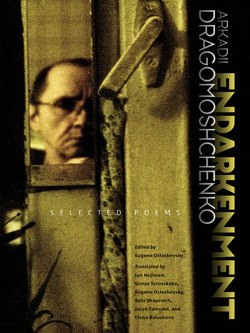Читать книгу Endarkenment - Arkadii Dragomoshchenko - Страница 8
На сайте Литреса книга снята с продажи.
ОглавлениеFOREWORD
The great Russian poet Arkadii Dragomoshchenko passed away on September 12, 2012. Born on February 3, 1946, in Potsdam, Germany, he spent his childhood in the Ukrainian city of Vinnytsia, which he experienced as a site at which numerous languages and cultures intersected and co-existed. At the time of his childhood, in addition to Ukrainian and Russian, one could hear Moldovan, Polish, Romany, and Yiddish on the streets of the city, and his awareness from early childhood of the language’s habit of producing simultaneously convergent and divergent meanings must be understood as a fundamental source of his poetry. Similarly fundamental was his memory of holes in the fence enclosing his grandmother’s small garden. These were the apertures through which he made his first conscious observations of the world, irregular circles of sensation. They were portals, but they became over time, emblematic, too, of the aporias that puncture consciousness and that neither knowledge nor speculation can ever fill. The polyglot city and the holes in the fence proved to be dual points of departure for Arkadii’s poetics; they also appeared in one of his first letters to me.
“My youth went by in the Ukraine,” he wrote, “in a small town in the southwest. Let’s write: there was a garden. There were holes in a fence. The grandmother had a God. There were holes in my memory, which later began to correspond to holes in fences, through which I used to run away, though their significance, I think now, is quite abstract. Let’s write: there was a book. And now I am wiping away my tears, and taking off a wet hat, gluing on an ink beard, and warming my hands over a fireplace. The rain was loud. I want to think of this town. From the 16th century on, this town was a real melting pot, simmering, over the flames, all sorts of things, cultures, languages, religions. Everything: Polish, Ukrainian, Russian, Greek, Catholicism, Orthodoxy, Judaism, and.… And again I hear this town’s dancing, intractable tongue.”1
Arkadii was exquisitely attuned to language, with its syllables and silences, its restless, ephemeral patterns—“the formulae of dragonflies.” His writings weave through the windy mists and sunstruck hazes of language, catching a flutter of movement at an etymological intersection, spotting a flicker of past desire in the echo of a word. In conversation his ideas came rapidly, even insistently, but he was a meditative writer, drawn into absences as well as intersections. He was obsessed with time, but not, as so many poets are, because he mourned its evanescence or transience. Instead, time as he came to know it, was expansive—moments don’t flee; they swell, spread out. He inhabited time, lingered in its circles, dreamed its language. His powers of scrutiny were microscopic and mystical; his magnitude of thought was macroscopic and sought the cosmos. He was a poet of the Far East and of the Far West; he was a philosopher of distance in whose thinking persistent attention was given to proximity.
He heard what most of us forget on waking, he caught the echo in the spaces between things, caught the faint aroma of some intention, some initial gesture, saw the shimmer raised by the intersecting of things, noted effects whose causes had gone astray or were still far in the future.
Occasion, coincidence, and chance caught his interest, because of the pull they exert on things. With Arkadii’s death, his writings, which were about the ephemeral and unlikely, chance encounters and shifting perception, quick changes of topic and the pursuit of echoes, have turned into philosophical science. He was a poet in the tradition of Lucretius, following atoms of sensation into the crinkled atmospherics of thought.
Now, in the wake of Arkadii’s unexpected death, key elements of his poetry seem to have intensified. His work always included elements of melancholy, his relation to the things of which he wrote always included a degree of irony and reserve, the intimacy with which time and things faced each other in his writing was always prolonged to the threshold of infinity. But now one can’t help but feel that, in writing this way, he was writing reality, not speculation. Or perhaps it is more accurate to say that he was writing permanence, that strange temporal field of the endless paradox in which plenitude and absence coincide.
“Now speech has lost its speed, it lags as the nights lag, becoming briefer and nevertheless longer. Time marvelously stills, involving one in its dance, allowing itself to stay in place in innumerable gradations. Hitherto unseen, but always having been, simple understanding doesn’t go away: the world whirling in a beautiful absence of will, in which glimmers an unintelligible belief in everything, to the point of idiotic tears, when one sets out for milk in the morning and stops at every step.”2
LYN HEJINIAN
